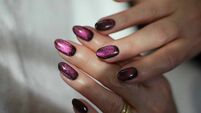Struggling to sleep... Dr Michelle O'Driscoll shares some tips

Without sufficient sleep, our cognitive processing declines, we become more irritable, and our energy levels dip, says Michelle. Picture: Stock
HEAD spinning, mind racing, tossing and turning, sleep eluding you… Ever find that, regardless of a smallie waking you in the middle of the night, you yourself may have trouble sleeping?
‘Trouble’ can come in the form of finding it difficult to get to sleep, difficulty staying asleep, or very early waking. The occasional night of broken sleep isn’t an issue but when it’s ongoing and affecting our daily functioning, it can become something that needs to be addressed.
Without sufficient sleep, our cognitive processing declines, we become more irritable, and our energy levels dip.
Insomnia is more common in women, and as we get older. Physical factors that can trigger or worsen it include menopausal or menstrual symptoms, mental health issues like anxiety or depression, daily stress levels rising due to pressures and demands, or coping with grief, environmental things like shift work, or physiological factors such as eating fatty foods late at night.
While there are medications available on prescription or over the counter as short-term aids, there are things you can implement as a first step or as a helpful addition to set yourself up for a better night of rest.
Sleep diaries are very useful to understand your sleep patterms, to identify how often you’re waking, what times, and potentially any links to things during your day or in your night-time routine that are correlated with disimprovements. They are also very motivating when you do establish better quality and duration of sleep to continue with any changes that you have made. A sleep journal doesn’t need to be a specific format, just a plain notebook with a few daily bullet points will suffice.

Sleep hygiene is a term that has become very mainstream, but what does it mean? It refers to the routine that you have in place around sleep, or for many of us, the lack of one! Do you try to get up and go to bed at the same time every day? Our body clocks adore routine! It’s not always possible, but where it is, try to not have marathon sleep lie-ins to ‘catch up’ on missed sleep but instead allow your body some regularity. Do you have the room dark enough? Warm or cool enough? Do you have protected time in the hour before bed where you’re off screens and away from the depleting blue light on your phone? Do you use your phone as an alarm clock, and then also as a crutch for night- time anxiety via scrolling?

Exercise is a double-edged sword. Going for a run and then straight to bed is not going to end well, as your body will still have energy coursing through it, but exercise further away from bedtime is really beneficial to burn off extra energy, and also to regulate your stress hormones.
Similarly, doing this out in the fresh air and getting sunlight for at least 30 minutes helps to regulate your internal circadian clock.
Looking at what we physically consume in the time before bed is also advised. Caffeine, alcohol, nicotine and fatty foods are all worth avoiding. If the body is working very hard to process these things, it’s going to be much less likely to transfer into rest mode. Doing things that instead signal to our bodies that it’s time to slow gently to a stop are helpful. Things like a yoga flow or meditation can become part of a very restful routine. The brain tunes into other sleep triggers too, which could be something like putting on a night-cream, or triggering scent memory by spraying lavender on the pillow. Anything that tells the brain ‘this is the lead-up to sleep’ will help reduce the duration of tossing and turning.
Racing brain is an issue that so many describe in that time trying to get to sleep. Getting all those worries and anxieties out onto paper by journaling before bed can be very therapeutic. You’re not getting rid of them, but they’re there on the page, and your mind can let them go for now, even.
And if it happens that you do wake up, and aren’t drifting back really quickly? Sometimes the best thing you can do is get up and out of the bed — read for a little while, break the toss-turn cycle, and you’ll be quicker able to get back to sleep.
And for new mums, all of this talk of sleep routines, and a lovely restful wind-down can be quite frustrating to hear, when any routine other than baby’s demands have gone out the window. The old advice of ‘sleep when baby sleeps’ really is worth its weight in gold, as clichéd as it sounds.
Perspective can shift for the better if you manage to grab even a couple of extra hours of rest. It helps to slightly lift the veil and offer a new lease of life, boosting physical and mental wellbeing.
Create your own flexible routine, gift yourself that rest time at least a couple of times in the week — the pile of laundry isn’t going anywhere!
Dr Michelle O’Driscoll is a pharmacist, researcher and founder of InTuition, a health and wellness education company.
Her research lies in the area of mental health education, and through InTuition she delivers health promotion workshops to corporate and academic organisations nationally. See www.intuition.ie







 App?
App?


